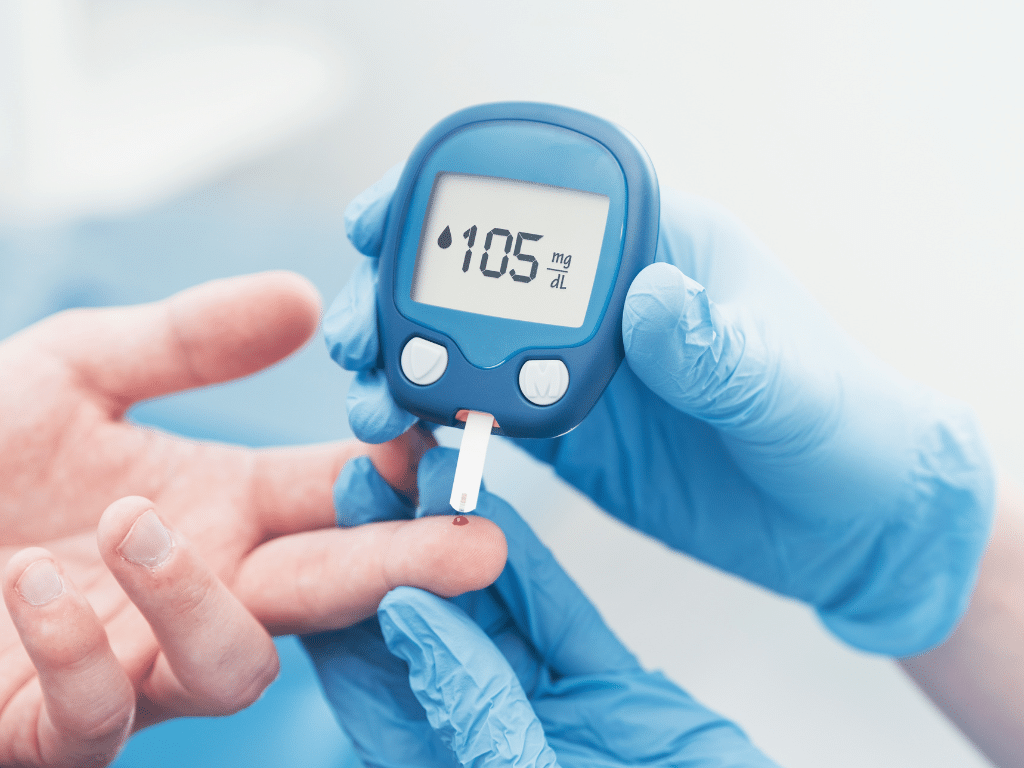Can Diabetes Be Cured? Understand the distinctions between curing and controlling diabetes, helping individuals set realistic health goals.
Studies have shown that bariatric surgery alleviates the symptoms of type 2 diabetes in many cases. Post-op weight loss maintenance is the key to diabetes remission. In the following piece, we will delve into the relationship between obesity and type 2 diabetes while examining the potential of bariatric surgery as a cure for diabetes. In the US, 40% of adults above 20 are heavier weight, with 32% having a higher body weight based on the BMI chart. These statistics are staggering! The fact that only 28% of adults in the United States are of a heavier weight is alarming. Several diseases and conditions have a direct relationship to obesity, type 2 diabetes being one of the top 3.
What is Type 2 Diabetes?
Type 2 diabetes is a condition that occurs when the sugar levels in our blood become too high. Why is there sugar in our blood? You might ask. When we consume food, our digestive system starts to break it down. It takes carbohydrates and turns them into glucose – a sugar that gives the cells in our body energy and is critical to our lives.
Next, our bloodstream delivers glucose to our cells to provide us with energy. Without insulin, glucose cannot enter cells. Essentially, insulin unlocks the cells to allow glucose absorption. After insulin performs its function and delivers glucose to the cells, blood sugar levels decrease and the cycle repeats.
The body naturally programs itself to maintain its health by storing glucose as glycogen in the liver and muscles as a reserve. When blood sugar decreases, our bodies signal us to eat. However, when there are complications, it can lead to dangerously high blood sugar levels.
In type 2 diabetes the body becomes resistant to insulin and causes chronic high sugar levels. An individual with type 2 diabetes needs to regularly monitor their blood sugar level, watch their diet, and may need insulin or some other type of medication to control their sugar levels.
Diabetes can be chronic, inhibit a patient’s quality of life, and can cause heart disease, nerve damage, kidney disease, and a host of other problems including death.
What Do Studies Say?
According to a study by the Postgraduate Medical Journal, of the 2,721 participating individuals who suffered from type 2 diabetes, 86% of them were higher weight. Researchers have conducted several other studies that show similar results.
Obesity is a large contributor to diseases like type 2 diabetes. The University of Pittsburgh conducted a small study made up of 61 patients with type 2 diabetes. They are separated into 3 groups:
- Group 1 had Gastric Bypass Surgery.
- Group 2 had Gastric Band Surgery.
- Group 3 underwent an intensive healthy lifestyle program without surgery.
Scientists closely monitored all of the patients for 3 years, tracking their weight, A1C levels, fasting blood sugar, hemoglobin, and the use of diabetes medication, including insulin.
Group 1
Showed the biggest improvement in all areas with an average reduction of 25% of their total body weight and 11% of body fat. This group also experienced the most reduction in waist size which was indicative of loss of visceral fat – the dangerous type of fat that surrounds internal organs and interrupts the processing of blood sugar.
Group 2
Showed a reduction of 15% in total body weight and a 6% reduction in body fat.
Group 3
Showed the poorest progress with an average of 6% total body weight loss and only a 3% reduction in body fat.
All three groups experienced an improvement in their blood sugar levels with the gastric bypass group seeing the most improvement and the Lifestyle group seeing the least. After 3 years, both the gastric bypass (65%) and gastric band groups (33%) had a significant amount of patients who no longer needed any medication to control their blood sugar levels. There was not one person in the Lifestyle group that went into remission.
The Gastric Bypass and Gastric Lap Band groups experienced added benefits. Both groups saw a significant improvement in cholesterol levels. The gastric bypass group also saw improvements in blood pressure levels while the gastric banding group saw an increase. The lifestyle group saw very little improvement in either.
Can Diabetes Be Cured with Bariatric Surgery?
If you’re wondering whether bariatric surgery can cure diabetes, it’s important to recognize the connection between obesity and this condition. By understanding that obesity can contribute to diabetes, it becomes clear that weight loss efforts can have a positive impact. So, if you’re looking to eliminate type 2 diabetes, shedding those excess pounds is key.
According to studies, individuals with a BMI of 35 or higher have a mere 1% chance of achieving a normal body weight on their own. This was evident in the University of Pittsburgh study, where the lifestyle group struggled to make sufficient progress by themselves. Achieving this goal is certainly not effortless!
Weight loss surgery has the potential to profoundly transform an individual’s life and, in some cases, even save it. Additionally, a study by the NBSR in the UK revealed that within just a year, an impressive 75% of type 2 diabetes patients who underwent bariatric surgery no longer required insulin or medication to manage their blood sugar. Moreover, various other studies and reports consistently reinforce the notion that bariatric surgery significantly alleviates type 2 diabetes.
Which Bariatric Procedure is Considered the Best for Type 2 Diabetes?
Over the past several years, researchers have dedicated numerous studies to learn more about obesity and how bariatric surgery influences type 2 diabetes in patients.
At first, doctors believed gastric bypass surgery was superior in treating the disease. Yet, a study tracking diabetic patients with higher weight over 5 years found that the reduction of weight, regardless of the method used, is what relieves diabetes symptoms.
For severely higher-weight patients, gastric bypass offers more help in losing weight because it not only limits the stomach size but reroutes a portion of the digestive system and causes malabsorption.
Gastric sleeve surgery has also been very successful in treating type 2 diabetes. Other non-surgical weight loss procedures can result in significant weight loss such as a gastric balloon or endoscopic sleeve gastroplasty.
Does Gastric Bypass Surgery Cure Diabetes?
Gastric bypass surgery is a wonderful tool to help higher-weight patients lose weight. Losing excess weight and reducing BMI is what relieves higher-weight patients from weight-related conditions and diseases such as type 2 diabetes.
Weight loss procedures can induce remission in type 2 diabetes. However, it is important to note that type 1 diabetes, being an autoimmune disorder, cannot be put into remission even after weight loss surgery.
Can Diabetes Return after Gastric Bypass?
Losing weight is crucial for diabetes remission. However, regaining weight can lead to more diabetic episodes. To delve further into this matter, the records of 72 higher-weight patients suffering from type 2 were thoroughly examined. These patients had undergone gastric bypass surgery and had attended follow-up visits for 3 years or more.
32% of the individuals experienced a total reversal of their diabetes. However, by the 5-year mark, 21% of these patients had their diabetes returned. Moreover, the patients who did not experience the reversal lost more weight and maintained it throughout the entire follow-up.
Researchers found that individuals with diabetes for over five years before weight loss surgery were nearly four times more prone to recurrence. Hence, heavier individuals should undergo weight loss surgery sooner rather than later. This would be beneficial not only to the patient but to the Healthcare System. Timing is the key when curing diabetes with Bariatric Surgery. For more information from Bartitic Surgeons’ perspective, watch the YouTube Video.
Hello Bariatric Surgery, Goodbye Diabetes!
Did you know that obesity plays a major role in the development of type 2 diabetes? Luckily, bariatric surgery offers a solution. This procedure promotes weight loss, leading to remission of type 2 diabetes and eliminating the need for medication. Discover how bariatric surgery can help diabetes be cured.
More successful bariatric surgeries can eliminate type 2 by helping patients lose more weight and maintain it. Studies show that procedures such as gastric bypass surgery and gastric sleeve surgery were more successful than gastric banding.
Can Diabetes Be Cured? Doctors May Recommend Bariatric Surgery for Diabetes
The link between obesity, weight loss, and type 2 diabetes remission shown in recent studies could be beneficial. According to the CDC, every year, people spend at least 237 billion dollars on medical costs related to diabetes.
In simple terms, one out of every four dollars spent on healthcare in the USA goes toward caring for patients with diabetes. No wonder the costs have gone up so much.
Cure the problem instead of only controlling the symptoms. Doctors hope that advances in medicine and patient education will reduce type 2.
If type 2 diabetes is being suffered from, and an interest in weight loss surgery exists. The team at IBI Healthcare Institute is ready to help you lose weight and live healthier. Moreover, experience the possibility of Diabetes being cured with bariatric surgery.









